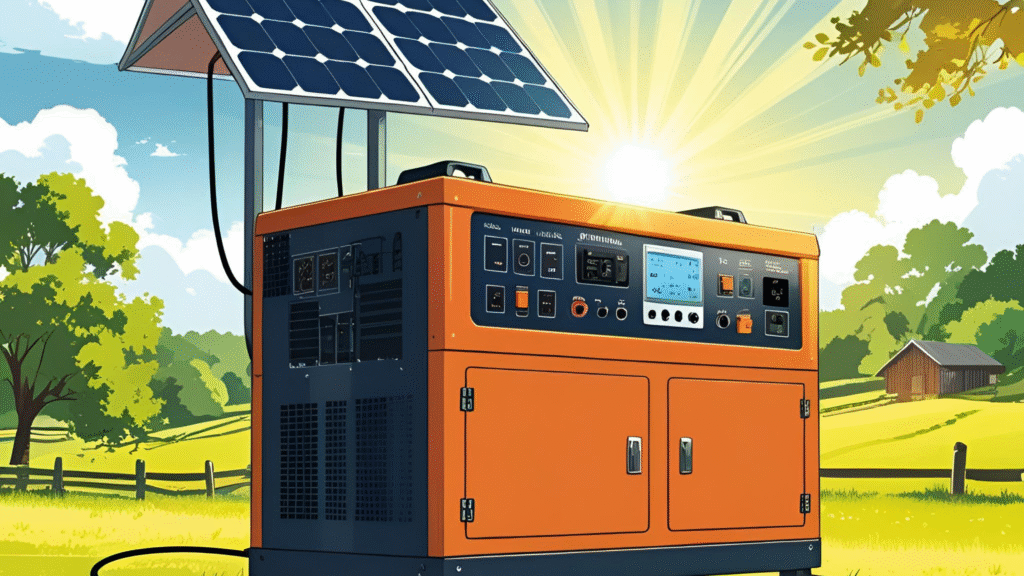What if your entire home could keep running for days—without the grid?
Power outages are becoming more common. Storms, grid failures, and rising energy demands leave many households vulnerable. But now, a powerful, compact solar generator is changing that.
Here’s what makes it a game-changer—and how it could keep your home powered for days.
What This Article Covers:
- What a solar generator is and how it works
- Why it’s ideal for backup power and off-grid living
- Key features to look for
- How much power it can really provide
- Real-life examples and data
- Practical tips for choosing the best unit for your home
What is a Solar Generator?
A solar generator combines four essential parts:
- Solar panels to capture sunlight
- A charge controller to regulate the power
- A battery to store energy
- An inverter to convert stored power into usable electricity
It works without fuel, noise, or maintenance. You simply connect the panels, let them charge the battery, and plug in your devices.
Unlike gas generators, there’s no exhaust, no risk of carbon monoxide, and no ongoing costs.
Why You Might Need One
If you’ve experienced a blackout, you know how quickly everything stops:
- Refrigerators warm up
- Lights go out
- Devices die
- Medical equipment shuts down
A solar generator gives you reliable backup—quietly and safely.
Even better, it’s portable. You can take it camping, on road trips, or to an off-grid cabin. It’s clean energy that moves with you.
Can It Really Power a Whole House?
Yes—depending on the generator and your power needs.
Here’s a breakdown of common home appliances and their average watt usage:
| Appliance | Average Wattage | Run Time on 2000Wh Generator |
| LED Lights (5 bulbs) | 50W | 40 hours |
| Refrigerator | 150W | 13 hours |
| Wi-Fi Router | 10W | 200 hours |
| Laptop | 60W | 33 hours |
| CPAP Machine | 40W | 50 hours |
You can scale up by connecting more panels or batteries. Some systems are modular, letting you expand as needed.
Features That Matter
When choosing a solar generator, look for:
- Battery capacity (measured in Wh): How much energy it stores
- Inverter output (measured in W): How many devices it can run at once
- Solar input: How fast it charges
- Port types: USB, AC, DC, and 12V car ports
- Portability: Weight and design for transport
Higher capacity models like the Bluetti AC300 or EcoFlow Delta Pro can power refrigerators, TVs, and even electric stoves for days.
How Long Does It Take to Charge?
It depends on sunlight and panel size.
Example:
- A 200W solar panel can charge a 2000Wh battery in about 10 hours of good sun.
- Cloudy conditions will extend that time.
Some models can also charge from wall outlets or car adapters for added flexibility.
Real-Life Use Cases
- Emergency Preparedness
One user in Texas used a 3000Wh solar generator to power their fridge, lights, Wi-Fi, and fan during a three-day power outage. It kept the essentials running and food from spoiling. - Off-Grid Living
A cabin owner in Oregon lives full-time with a solar generator and five panels. They power lights, internet, cooking appliances, and a TV. - RV Travel
Travelers using Jackery units charge their phones, laptops, fans, and even electric coolers without ever needing campground power.
Is It Worth the Cost?
Solar generators range from $300 to $5,000+, depending on size and features.
Here’s why they’re worth it:
- No fuel needed
- No noise
- Long lifespan (up to 10 years or more)
- Low maintenance
- Clean energy source
Some models qualify for federal or state solar incentives, reducing upfront costs.
How to Choose the Right Generator
Start by answering:
- What do you need to power during an outage?
- How many hours should it last?
- Do you want to expand the system later?
- Will you use it off-grid or only for emergencies?
Then compare:
- Wattage (continuous vs peak)
- Charge time
- Battery chemistry (LiFePO4 lasts longer)
- Brand reputation and warranty
Final Thoughts
Solar generators aren’t just for emergencies. They’re a smart move if you want reliable, quiet, and clean backup power.
With more extreme weather, unstable grids, and rising costs, investing in a solar generator could be one of the most practical upgrades for your home.
Are you ready to make your home blackout-proof?



